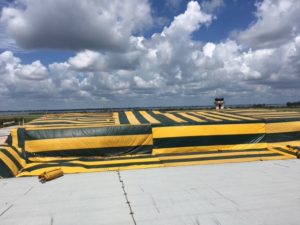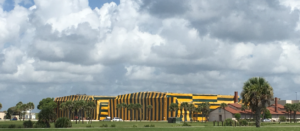Looking for Access?
Cur nutrix cantare?Est camerarius accentor, cesaris.Eposs sunt solems de varius liberi.
Register TodayCur nutrix cantare?Est camerarius accentor, cesaris.Eposs sunt solems de varius liberi.
Register TodayCur nutrix cantare?Est camerarius accentor, cesaris.Eposs sunt solems de varius liberi.
Login Now
Roberto Rivera started working on fumigation jobs for his father when he was 16, and the main lesson he was taught was to do whatever was necessary to do to get the job right. That is how his father built one of the largest pest control companies in Puerto Rico, and that same business approach has helped Roberto make his own company, Central Fumigation Department, in Miami, Florida, successful.
Doing whatever it takes is easy to say but not always so easy to put into effect. This past July 4th holiday weekend, Roberto says he faced one of the most challenging jobs in his 32 years of fumigation work. The fumigation was for a heavy drywood termite infestation in the roofing of twin aircraft hangers at MacDill Air Force Base in Tampa, Florida. Central was handling this fumigation for Truly Nolen, and the base wanted the fumigation completed over the three-day holiday weekend while many personnel would be off duty.
It was a sensitive job, as this is the Air Force base responsible for Air Force One maintenance. To prepare for this government job, Roberto made two four-hour drives from his company headquarters in Miami to ensure that everything would be ready. In part, that meant completing all the necessary security background checks for everyone on his team.
Prior to fumigation, he and Air Force personnel walked through a checklist of all hanger contents.
“They were concerned about possible damage to some materials,” Roberto says. “There were aircraft parts in the hanger and so I contacted my sales rep for Vikane, Steve Niedzwiedzki, to have him explain the fumigation process with Vikane gas fumigant to them. I knew the answers to their questions, but felt it would be best for them to hear it from an expert from the manufacturer.”
Air Force personnel agreed that computers, files, lubricants and tools could remain in place during the fumigation, but as an added precaution they decided to remove aircraft parts.
In addition to reviewing the fumigation plan, Roberto needed to provide documentation of liability and workers’ compensation insurance. The fumigation plan required arranging the logistics, including renting a boom and crane and a 26-foot truck to transport all the equipment. The cylinders of Vikane® gas fumigant were moved on a company truck to comply with DOT requirements.

The two connected aircraft hangers totaled 2.5 million cubic feet. As a commercial fumigation company, Central is staffed with five fumigation crews with five on each crew. To get this job done over the holiday, Roberto brought four crews.
The biggest issue with interior preparation was figuring out how to chain the huge sliding doors to secure them. And to ensure results, two monitor hoses were placed in each hanger, one placed low and one high where the termites were infesting the wood roof members. To achieve rapid equilibrium, 20 fans were placed in each hanger. Power was cut at the breaker box. Air Force personnel were on-site during the entire fumigation preparation stage.
“My main concern about this job was the time of the year and the location of the hangers,” he says. “This area gets frequent afternoon storms in July and the hangers were just 500 feet from the beach. So, wind was a real concern because the hanger walls are 50 feet high.”
His crews began tarping the hangers first thing on Saturday morning. The plan was to introduce the fumigant about 7 p.m. that day. But about 4 p.m., a storm hit with 20 mph winds.
“The hanger’s about three-fourths tarped when the winds hit, and pretty soon all the tarps were on the ground. It was raining. Everyone was tired. So, I called everyone together and said we’ll come back tomorrow.

“We came back first thing Sunday morning, but this time we used sand snakes on the roof. We had a storm again Sunday, and about 4 in the afternoon it opened up the tarps again, although not as much as on Saturday.
“I had called my son on Saturday to make the drive up from Miami to bring us more clamps so we could tighten up the tarp seams. We did that on Sunday after the storm and were able to introduce the gas about 9 Sunday night.”
To get the fumigation done on schedule, Roberto used a heavier fumigant rate. He had planned to use six or seven cylinders in total, but to meet the deadline, would now require about 11 cylinders. He says the smartest thing he did was bring extra cylinders of Vikane just in case.
Roberto stayed up all Sunday night to monitor the RDA readings on his iPad. By 7 a.m. Monday, the required C/T had been achieved.
“Being able to take readings every hour ensures the results and it provides documentation. We use remote monitoring on any job that is 250,000 cubes or more to ensure the needed results,” Roberto says. “On this job we made sure we had a good seal and that made it possible to break the seal Monday morning. When we entered the hangers, the floors were covered with dead termites.”
Aeration was easy, as opening the giant hanger doors let the wind blow through. Fans were used to aerate the office areas. By the time it stormed on Monday afternoon, the Central team had completed the job. On the drive home they celebrated with a dinner at a nice restaurant.
“Technically, it was not a hard job. But if I had it to do over again, the one thing I would have done would be to have included putting water snakes on the roofs as part of my fumigation plan. And I would have brought more clamps.”
So, while Central had to us more fumigant than planned and needed hotel rooms for a second night for the entire crew, the expected results were delivered — the drywood termites were eliminated and the job was done on time and done safely.
“We made some necessary adjustments,” Roberto says. “Like my dad said, always do the right thing, because if you lose your reputation, you’re done in business. To me that means that if you can’t do something the right way, then don’t even start it.
“I’m really in this industry because of my dad. It’s the only thing I have done in my life. I owe my success to my dad. He’s no longer active in the business, but he’s still someone I can talk to about things. He’s still my mentor.”